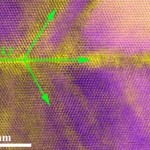 Most people see defects as flaws. A few Michigan Technological University researchers, however, see them as opportunities. Twin boundaries — which are small, symmetrical defects in materials — may present an opportunity to improve lithium-ion batteries. The twin boundary defects act as energy highways and could help get better performance out of the batteries. This finding, published in Nano Letters earlier this year, turns a previously held notion of material defects on its head. Reza Shahbazian–Yassar helped lead the study and holds a joint appointment at Michigan Tech as the Richard & Elizabeth Henes associate professor in nanotechnology and an adjunct associate professor in materials science and engineering. Anmin Nie, a senior postdoctoral researcher in his group, conducted the study.
Most people see defects as flaws. A few Michigan Technological University researchers, however, see them as opportunities. Twin boundaries — which are small, symmetrical defects in materials — may present an opportunity to improve lithium-ion batteries. The twin boundary defects act as energy highways and could help get better performance out of the batteries. This finding, published in Nano Letters earlier this year, turns a previously held notion of material defects on its head. Reza Shahbazian–Yassar helped lead the study and holds a joint appointment at Michigan Tech as the Richard & Elizabeth Henes associate professor in nanotechnology and an adjunct associate professor in materials science and engineering. Anmin Nie, a senior postdoctoral researcher in his group, conducted the study.
Read More
 Drought in the southwest has left only a trickle running through irrigation ditches on farms outside El Paso, Texas. The Rio Grande — called Rio Bravo in Mexico — is what supplies that trickle, struggling to meet water demands in three US states and five in Mexico.
Drought in the southwest has left only a trickle running through irrigation ditches on farms outside El Paso, Texas. The Rio Grande — called Rio Bravo in Mexico — is what supplies that trickle, struggling to meet water demands in three US states and five in Mexico.
As drought continues, and demand grows, researchers like Alex Mayer from Michigan Technological University are looking to new models to improve the region’s drought resiliency. Mayer, a professor of environmental engineering at Michigan Tech, is part of a unique team looking at water resources along a section of the Rio Grande. The National Institute of Food and Agriculture, part of the US Department of Agriculture, has awarded the project a $4.9 million grant to study water shortage and climate change for the next five years in the region.